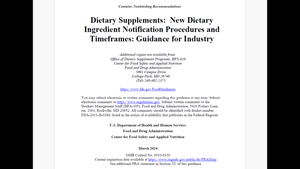Gap in Food-Safety Leadership Grows as FDA Hunts for Permanent Supplement Chief
Since Daniel Fabricant rejoined the 78-year-old Natural Products Association (NPA) in Washington, FDA has named two officials to temporarily oversee supplements.
.png?width=850&auto=webp&quality=95&format=jpg&disable=upscale)
WASHINGTON—In a U.S. dietary supplement industry worth more than USD $20 billion, Daniel Fabricant was known as a hard-working and matter-of-fact regulator, bent on boosting compliance with years-old regulations that are intended to ensure supplements are made safely and with the same consistent quality.
He resigned as FDA’s director of dietary supplement programs in April, leaving a bureaucracy that has been criticized for too rarely prosecuting companies that cut corners on their obligations to produce safe supplements, make unfounded medical claims and spike ingredients with pharmaceutical drugs. Fabricant’s departure, and FDA’s ongoing search four months later for a permanent replacement, illustrate a growing leadership void within the agency’s Center for Food Safety and Applied Nutrition (CFSAN).
Since Fabricant rejoined the 78-year-old Natural Products Association (NPA) in Washington, FDA has named two officials to temporarily oversee supplements, William Correll (now director of the Office of Compliance) and Charlotte Christin, who is currently acting director of the division of dietary supplement programs. Formerly special assistant to the director from the Office of Compliance, CFSAN, Christin began her new job on June 16.
Kimberly Rawlings, an FDA official, said the Office of Nutrition Labeling and Dietary Supplements (ONLDS) plans to rotate several officials to oversee supplements while the agency searches for a permanent replacement.
FDA is known to take time to fill such positions. In December 2012, Barbara Schneeman retired as the director of ONLDS. FDA still hasn’t hired a permanent successor to her.
Rawlings said the agency couldn’t speculate on the timing to permanently fill the positions.
“The individuals who serve as acting directors are qualified and capable to lead the qualified DDSP (director of dietary supplement programs) staff to sustain and support the dietary supplement program as the regulatory mission continues," Rawlings said. “The dietary supplement program is part of a larger organization with substantial organizational leadership. The organization’s priorities, objectives, and expectations remain as they were, and have not been affected or sidetracked by a change in the directorship."
FDA is seeking to fill the vacancies at the same time that its top food-safety official plans to retire as director of CFSAN.
Michael Landa, whose career at FDA dates back to 1978, asked the agency to begin searching for a successor, a move Rawlings said “will allow for overlap of tenure and a smooth transition, with minimal disruption to the center’s many important programs."
A former FDA official who agreed to speak on condition of anonymity and now works in the private sector indicated FDA could face a debilitating situation if it doesn’t find permanent directors by the end of the year to lead CSFAN, ONLDS and the dietary supplement division.
“Very little gets done when you are in those kinds of situations," the source said.
Loren Israelsen, president of the United Natural Products Alliance (UNPA), said the pool of qualified candidates to succeed Fabricant is relatively small. Compared to the conventional food and pharmaceutical industries, few individuals have the required range of expertise in the dietary supplement space, said Israelsen, who worked with Sen. Orrin Hatch (R-Utah) 20 years ago on the landmark legislation (Dietary Supplement Health and Education Act of 1994 or DSHEA) that governs the industry.
“Lack of an engaged regulator [is] not a good [thing] and [there is] virtually nothing we can do about it," Israelsen said.
The dietary supplement industry does not expect temporary FDA officials to make courageous moves or set a new course for supplement regulation.
“When you have someone who is not a permanent appointment, they are not going to make bold decisions to commit the agency to some policy direction," said Steve Mister, president and CEO of the Council for Responsible Nutrition (CRN). “They are not in power to make broad policy decisions for the agency. They are there to make sure the trains run on time from the day-to-day standpoint."
The absence of permanent leadership could exacerbate a delay in the release of a new dietary ingredient (NDI) draft guidance that the industry has been awaiting. The previous NDI draft guidance issued by FDA met resistance from the industry and lawmakers on Capitol Hill.
Scott Bass, general counsel for NPA and head of the global Life Sciences team with Sidley Austin, said trade organizations held a number of meetings regarding the NDI draft guidance with FDA officials, including Fabricant in 2012 and 2013.
“To some extent, those discussions will now be background and not someplace where we can start to move the ball forward," Bass said.
FDA’s dietary supplement division is staffed with around two dozen individuals. Without a leader, the former FDA official said, morale could sink for the rest of the team.
“The general bureaucratic staff has to have leadership so they feel energized, so they feel that they are important and that they are doing things that are benefiting the public," this person said. “When you basically have caretakers sitting in those positions the staff … gets demoralized."
Steven Grossman, deputy executive director of the Alliance for a Stronger FDA in Silver Spring, Maryland, said FDA endures cycles of turnover in leadership because the officials tend to be older with more seniority.
“Many federal agencies and departments operate without permanent directors and do so seamlessly because they have extremely capable and supportive staffs," said Stan Hazan, senior director of regulatory affairs with NSF International, a third-party auditor and certification company supporting several industries including dietary supplements. “The FDA has had several Dietary Supplement heads over the last decade without interruption in carrying out its mandate."
The supplement chief vacancy doesn’t mean the industry can relax or is under-regulated, said American Herbal Products Association (AHPA) president Michael McGuffin, who noted dozens of FDA inspectors are continuing to investigate dietary supplement facilities for compliance with cGMPs (current good manufacturing practices).
FDA inspectors “are still being very stern in their evaluation of compliance with cGMPs. There is still an expectation if you are selling an NDI to file a notification unless you’ve got an exemption for one of the established reasons," McGuffin said. “Adverse event reporting requirements haven’t changed. You still need to register your facilities. I don’t think there’s a sense that just because there’s one vacant position in the division anybody should relax nor have I heard anybody in the trade say that they have relaxed."
But should a health crisis unfold implicating supplements, CFSAN needs leadership who can deal with such a predicament, said the former FDA official. Otherwise, this person said, it’s possible that a political outcry to change DSHEA could result in “sudden hysteria" and “a huge change in the regulatory framework."
In the dietary supplement division, enforcement is a large component of the job, and a relatively independent position within the agency’s food-safety hierarchy, said another former FDA official who agreed to speak anonymously and currently works in the private sector.
“You can’t have someone in that role who is a lightweight," this person said.
Even when FDA had a permanent leader of dietary supplements at the helm, FDA endured criticism for not being tough enough in its enforcement against companies that have introduced adulterated products in the marketplace or otherwise skirted compliance with federal law.
Marc Ullman, a food and dietary supplement lawyer in New York, cited a more systematic problem than a lack of leadership at FDA: a reticence to take enforcement action unless the agency has first issued a warning letter. He expressed a belief that such a culture originates at FDA’s Office of the Chief Counsel.
“It’s preposterous to think that companies making claims that they can cure cancer or manufacturing their so-called dietary supplements that are spiked with pharmaceuticals or producing without any regard whatsoever for GMPs deserve to be warned that what they are doing is illegal," Ullman said. “The Federal, Food, Drug and Cosmetic Act [FD&C] says you are committing a crime if you are selling adulterated or misbranded regulated products. There is no requirement that you be warned, and the Supreme Court has said this is a strict liability statute for misdemeanor prosecutions."
That means federal prosecutors need not establish an intent to violate the FD&C, only that an adulterated or misbranded product was introduced into interstate commerce.
“The U.S. government could prosecute these cases with first-year" assistant U.S. attorneys, Ullman said. “This would not be a drain on anyone’s resources if the matter was taken seriously, if there was a will to enforce."
Decisions on whether to take enforcement action may come down to politics—various officials within the agency have a say—as well as practical matters: a shortfall of funds and a reliance on the U.S. Justice Department to prosecute cases on behalf of FDA.
FDA, which regulates roughly 20 percent of consumer spending, is notoriously underfunded and is a cog in the large chain of federal bureaucracy. According to the Alliance for a Stronger FDA, the agency has an annual food budget of approximately $1 billion. Relatively few funds are earmarked for dietary supplements. Citing FDA officials, the U.S. Government Accountability Office revealed the agency's resources for all dietary supplement activities increased from $14.6 million in fiscal year 2009 to a projected $18.9 million in fiscal year 2012.
Fabricant, presently CEO and executive director of NPA, said it is important for the new supplement chief to interact well with FDA’s field offices and “build strong alliances with the Department of Justice and U.S. Attorney’s Office."
Pieter Cohen, an assistant professor of medicine at Harvard Medical School and vocal critic of supplement regulation, complained that FDA hasn’t moved swiftly enough to protect the public health.
For instance, he said FDA didn’t remove a controversial amphetamine derivative known as DMAA (1, 3-dimethylamylamine) from the market until after the media detailed health problems associated with it and the Defense Department removed DMAA supplements at military exchanges. DMAA was on the market for six years before FDA issued warning letters to companies that sold it, Cohen said.
“Even when someone like Dan who … cares very much about the public health … took that role extremely serious, this is the progress that was made, which is very concerning," said Cohen, who cited safety concerns with other supplements. “We can just imagine what’s happening now during a period of transition."
Over the years, trade associations such as CRN have sought to combat criticism that the dietary supplement industry operates under a light regulatory regime or is overrun by rogue companies with disregard for quality products and public health. Mister said it is critical FDA have the appropriate staff to enforce the law.
“It’s very important we have a robust agency because we believe the law gives FDA all of these tools and when the tools are used the law is sufficient to protect consumers," he said. “If you don’t have the personnel in place and you don’t have the political willpower to enforce the law … then the law doesn’t get enforced the way it was meant to in order to protect consumers and to protect the industry."
About the Author(s)
You May Also Like






.png?width=800&auto=webp&quality=80&disable=upscale)